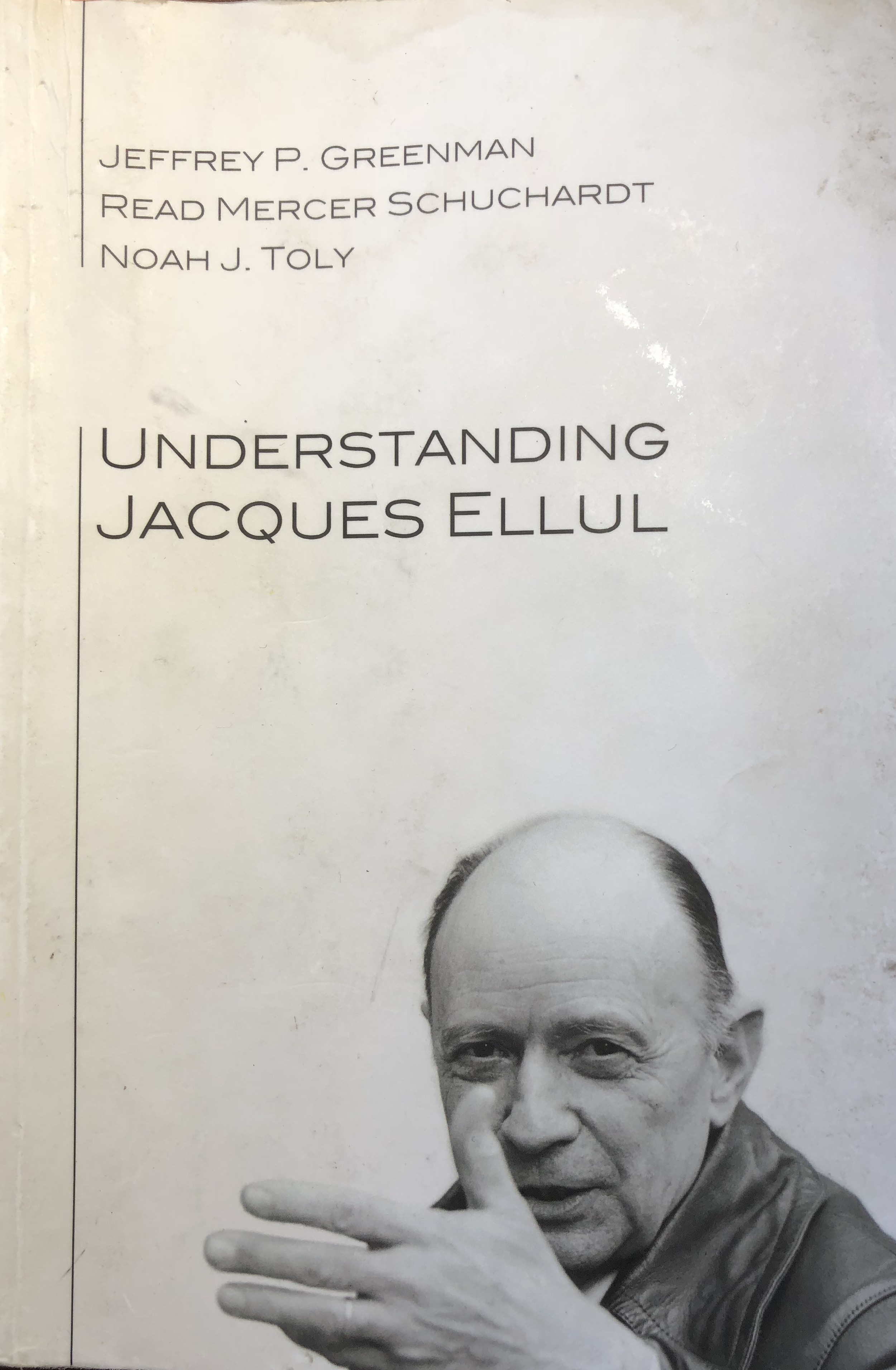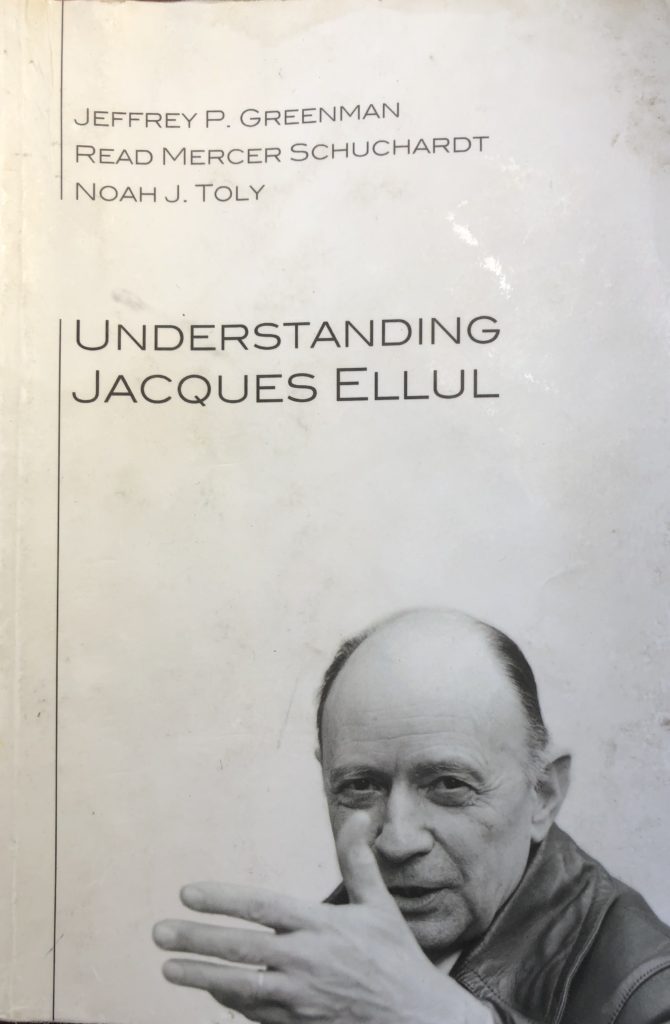
Ellul may often be wrong, but he is never dull…when one engages the thought of Ellul, there is no such thing as a casual reading followed by mild acceptance or bland rejection.
And so it is with this eccentric French philosopher turned Christian. This book is an excellent, introduction to this man of many thoughts. In the review below I have laid out for you some of his bigger ideas.
The Danger of Technology/Technique and Efficiency
Technique tolerates no judgement from without and accepts no limitations… Since it has put itself beyond good and evil, it need fear no limitations whatever. In a technological society, efficiency, rather than goodness, truth, beauty or justice becomes the norm for social relations.
If we can build it, invent it, make it or do it, we should, especially if it makes us more efficient. Efficiency becomes the anchor point for our morality. For Ellul, this is the most “anti-human” way to go about life. For many Ellul is dismissed as a Luddite crank, a grumpy old man who refuses to get with the times. A future hater and a technophobe. I wonder if Ellul would have “tisk-tisked” the invention of the wheel or printing press had he been alive in those days. He may well have!
I also question Ellul’s contention that efficiency supplants goodness, truth and beauty as we develop and grow. Much modern architecture would suggest otherwise, besides what can be said of the worldwide movement to take care of our planet? Undoubtedly, the rise of our environmental consciousness has altered the way we go about living? If technology and technique are poured into making our planet flourish as it was meant to flourish, how is that bad?
At the same time that I raise a skeptical eyebrow in his direction, I also begin to feel like he is on to something. The human race today is rocketing forward with one paradigm breaking invention after another. If the “pace of progress” is swallowing up the souls of men than technology and the worship of efficiency are implicated.
Propaganda and the Church
Propaganda is the use of words, methods and psychological technique’s to sway individuals and groups of people into participation with an organization. Christianity is to have none of this. Instead, our faith is to spread slowly, relationally, from person to person focusing only on the person of Jesus. “We do not bring non-Christians into Church we carry the church to them” Unfortunately, Churches prefer to engage in the full constellation of propaganda techniques instead. When propaganda is used truth is exchanged for power. This trade utterly de-Christianizes the church. Is he right? What exactly does Ellul mean when he talks about propaganda? Social media? Catchy Christian sounds bites? Shiny new buildings? Christian radio? Mass advertising campaigns? State of the art sound and lighting? Mr. Ellul what exactly are you against here??? He doesn’t say! But you get the sinking suspicion that he is probably thinking of all of I’ve just mentioned and more. The church is not a burger joint out to manipulate people into buying burgers, so anything the burger joint might do to get people eating their burgers, the Christian church probably shouldn’t. Again he is on to something here, but what would a propaganda free church look like? Does such a church even exist?
The Supremacy of Words & Hearing
When I read this chapter for the first time, I dismissed it as garbage. Now I’m picking through the trash bag one more time to see if I missed anything. Ellul says that since speech is the one thing the distinguishes humans from non-humans, it’s the most important thing. Words are supreme; God has made it so. He puts his conviction succinctly “In the sphere of truth everything is related to the word, nothing to sight” He quotes Jesus for support. “Blessed are those who have not seen and yet have believed” Our image-saturated society has created nonthinking emotional spectators who must only believe whatever flashes in front of their eyes. In our day words live in total submission to images. They only exist as slogans for visually charged propaganda. Images bring about less and less thought and reason. Again, as I think about what Ellul is saying, I begin to wonder if he is on to something. But immediately I revolt, the Psalmist says the heavens declare the glory of God. Those heavens have to be seen! God did create all the senses, and they are all good, not just the ears! Police wear body camera’s now because video tells more of the truth than words do. Would Ellul dispute this? What is visual is not some dirty bit of business designed by the devil.
Even still, his writing stirs something in me. It does seem correct that we are not able to properly think about things when they come to us visually. Images always create immediate visceral reactions it’s what they do. Ellul laments that “Images are considered trustworthy while words are suspect” In today’s era of “Fake News” I think everything has become suspect both audio and visual. So maybe Ellul has become dated? We have entered into an era of skepticism and narcissism are images to blame? Ellul says yes.
Reality and Truth
Reality is what is seen, counted and quantified. Realities world is the material world, and it can be known through the accumulation of data. Truth is different; truth pertains to questions of purpose or meaning. Images are helpful in determining reality; they are not helpful in determining the truth. Because the world has become image based we have become “utterly indifferent to the question of truth” says Ellul. In the modern mind, reality has become truth, and nothing exists beyond reality. When Christians use images to help them discover the truth, reality and truth get confused, and we are worse off for it. He doesn’t quite take us back to the Iconoclastic debate which helped to weaken the Byzantine empire. See my review of that crazy time in Church history, but he warns us through Augustine “Images can be used, but they should never be loved.” Is there actually a difference between truth and reality, or is this just Ellul doing his thing? I don’t know. This distinction is a more sensible way to attack images and put them in their proper place I suppose. I’m just not ready to say that there is no “truth” from anything that we happen to take in through our eyes. That’s nonsense to me.
The City is the Devils Playground
Ellul’s work on the city is easily his most unpopular. Its English title was The Meaning of the City, but Ellul’s critics all insist that it should be renamed The Demeaning of the City. Ellul believes that the first city was built by Cain as an act of rebellion against God. Therefore all cities have in their DNA a rebellious rejection of God. From Babel onward cities have a bad rap in the Bible When humans come together God gets pushed out; it is as simple as that. Ellul doesn’t hate cities totally, he believes Jesus will one day redeem them, but he holds out no hope for Christians having success in cities before the return of Christ. Thus he is critical of city planning and technological advancements to make cities better. To Ellul, this is just putting a band-aid on a systemic problem. Beautiful walkways and rapid transit, won’t free the city from evil. If a Christian finds himself in the unenviable position of living in an urban environment, he should focus in on practicing faithfulness to God through varying degrees of martyrdom, for that is all the city brings to the Christian who call it home. I have to admit this is pretty depressing and I would like to reject Ellul thoughts on the city, all through my last eight years in our city match up nicely with what he has said. So there is that.
Politics, Economics, and Work
I read somewhere that Ellul was a Christian anarchist. I can see why now. People worship their systems whether it be communism, fascism, or capitalism. Ellul loves to profane all three. Capitalism’s god is money. How can a Christian revolt against the idolatry of this system? By giving his money away. The God of fascism and communism is the ruler and loyalty to “The Fatherland” or the “collective system” a Christian can resist this idolatry by affirming the liberty of the individual person. When it comes to politics a Christian’s job is to desacralize it all. This doesn’t mean non-involvement, but it does mean having the conviction that every system is fundamentally flawed. We work within our various systems, but we don’t get hopeful about them.
Working for joy and working for beauty is part of God’s gift. However, work out of necessity to gather a surplus, to make a living or to produce is all part of the curse. That whole Protestant work ethic thing, Ellul wouldn’t subscribe to I don’t think. For him, It’s just a convenient excuse to justify ruthless capitalism.
The Authority of Scripture
“Scripture is God speaking to humanity through the text…It is clear that every living word of God cannot be different from that which is attested precisely in the Bible…It turns out that the God who spoke to men in the Bible is also our God, and directly ours, thanks to their witness.”
He acknowledges that faith is ultimately the only way anyone can arrive at the above conviction.
Regarding interpretation, Ellul thought it best to stay away from overly literal and historical investigation. The Scripture’s were not intended to be picked apart into little pieces with all details analyzed. What mattered was to keep the big ideas of Scripture in the forefront. So for example, a detailed look at Genesis as the historical, objective account of how we came to be would be a mistake. The big idea of the first part of Genesis is learning how God relates to man.
Finally for Elull love is the centrepiece of the image of God in each human. Love only exists if there is freedom. So God’s gift of freedom to humanity means that “God submits himself to human initiatives…God withdraws in order to leave the field free for humanity…God does not step by step, minute by minute, dictate what is to happen in the world, thereby establishing the reality of that world, as it were.” With this view, sovereignty and even divine providence get shoved aside. Anything that smacks of “fate” has to bow the knee to freedom. The age-old paradox that has the free will of man in tension with the sovereignty of God is solved for Ellul — but not for me.
Christian Ethics
We don’t know it all — Christian Ethics should be a temporary guide that is continually revised, reexamined, and reshaped by the combined effort of the church as a whole
We shouldn’t be pushy — One of the essential rules of the Christian like is never to ask a non-Christian to conduct himself like a Christian.
Christians are not about rules — Gods revelation has nothing whatever to do with morality. Nothing. Absolutely nothing. He goes on to say that Christianity is fundamentally about a relationship with Jesus Christ, to which no Christian would disagree. However, such a statement is a bit misleading; one need only read the Bible to see that morals are kind of a big deal to God.
Absolute Freedom — Love pre-supposes freedom, the Christian is free to do what he wants; there are no lists. How then does the Christian not disintegrate into subjectivism and relativism? Ellul hints at three answers. The Holy Spirit will guide us, freedom is not a revolt against order, and love is a good guide. Living out Christian freedom is exhausting work! It’s much easier to follow a list. But Ellul is certain the easier path is not, the better path when it comes to ethics.




